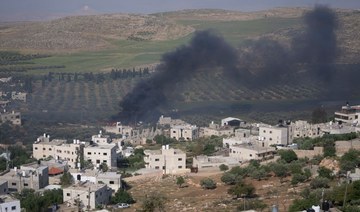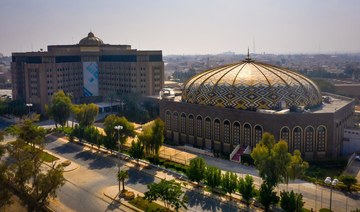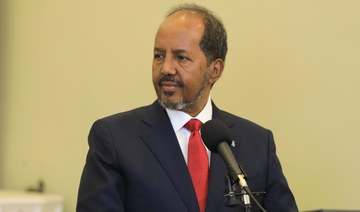SAN SALVADOR: The cell phones of nearly three dozen journalists and activists in El Salvador, several of whom were investigating alleged state corruption, have been hacked since mid-2020 and implanted with sophisticated spyware typically available only to governments and law enforcement, a Canadian research institute said it has found.
The alleged hacks, which came amid an increasingly hostile environment in El Salvador for media and rights organizations under populist President Nayib Bukele, were discovered late last year by The Citizen Lab, which studies spyware at the University of Toronto’s Munk School of Global Affairs. Human-rights group Amnesty International, which collaborated with Citizen Lab on the investigation, says it later confirmed a sample of Citizen Lab’s findings through its own technology arm.
Citizen Lab said it found evidence of incursions on the phones that occurred between July 2020 and November 2021. It said it could not identify who was responsible for deploying the Israeli-designed spyware. Known as Pegasus, the software has been purchased by state actors worldwide, some of whom have used the tool to surveil journalists.
In the El Salvador attack, the heavy focus on editors, reporters and activists working inside that single Central American country points to a local customer with a particular interest in their activities, said Scott-Railton, a senior researcher at Citizen Lab.
“I can’t think of a case where near-exclusive Pegasus targeting in one country didn’t wind up being a user in that country,” Scott-Railton said.
Citizen Lab released a report https://citizenlab.ca/2022/01/project-torogoz-extensive-hacking-media-ci... on its findings on Wednesday.
In a statement to Reuters, Bukele’s communications office said the government of El Salvador was not a client of NSO Group Technologies, the company that developed Pegasus. It said the administration is investigating the alleged hacking and had information that some top administration officials also might have had their phones infiltrated.
“We have indications that we, government officials, are also victims of attacks,” the statement said.
Pegasus allows users to steal encrypted messages, photos, contacts, documents and other sensitive information from infected phones without users’ knowledge. It can also turn handsets into eavesdropping devices by silently activating their cameras and microphones, according to product manuals reviewed by Reuters.
NSO, which has long kept its client list confidential, declined to comment on whether El Salvador was a Pegasus customer. The company said in a statement that it sells its products only to “vetted and legitimate” intelligence and law enforcement agencies to fight crime and that it is not involved in surveillance operations. NSO said it has a “zero-tolerance” policy for misuse of its spyware for activities such as monitoring dissidents, activists and journalists and that it has terminated contracts of some customers who have done so.
Citizen Lab researchers said they began a forensic analysis of the El Salvador phones in September after being contacted by two journalists there who suspected their devices might be compromised.
Researchers said they ultimately found evidence that spyware had been planted on a total of 37 devices belonging to three human-rights groups, six news publications and an independent journalist.
Hardest hit was the online news site El Faro. Citizen Lab researchers said they found telltale tracks of spyware infections on the cell phones of 22 reporters, editors and administrative personnel — more than two-thirds of the company’s staff — and evidence that data had been stolen from many of those devices, including a few that had several gigabytes of material extracted.
El Faro was under constant surveillance during at least 17 months, between June 29, 2020 and November 23, 2021, with the phone of Editor-in-Chief Oscar Martinez infiltrated at least 42 times, Citizen Lab claimed.
“It is hard for me to think or conclude something other than the government of El Salvador” was behind the alleged hacks, Martinez said. “It’s evident that there is a radical interest in understanding what El Faro is doing.”
During the time of the purported infiltrations with Pegasus, El Faro reported extensively on scandals involving Bukele’s government, including allegations that he was negotiating a financial deal with El Salvador’s violent street gangs to reduce the homicide rate to boost popular support for the president’s New Ideas party.
Bukele, who spars frequently with the press, publicly condemned El Faro’s reporting on those purported talks as “ridiculous” and “false information” in a September 3, 2020 Twitter post.
Phone snooping isn’t new to El Salvador, according to Citizen Lab. It alleged in a 2020 report that El Salvador was among at least 25 countries using a bulk surveillance technology made by an Israeli company called Circles. The Circles technology differs from Pegasus in that it vacuums up data from the global phone network instead of planting spyware on specific devices. The report claimed the Circles system had been in operation in El Salvador since 2017.
Circles could not immediately be reached for comment.
Sofia Medina, Bukele’s communications secretary, noted that his administration was not in power in 2017 and claimed, without providing evidence, that the alleged Pegasus attacks appeared to be a continuation of surveillance launched by an unknown “powerful group.”
Citizen Lab’s latest investigation in El Salvador was conducted as a collaboration with digital-rights group Access Now, with investigative assistance from human-rights groups Frontline Defenders, SocialTIC and Fundacion Acceso.
Salvadoran journalists’ phones hacked with spyware, report finds
https://arab.news/535nf
Salvadoran journalists’ phones hacked with spyware, report finds
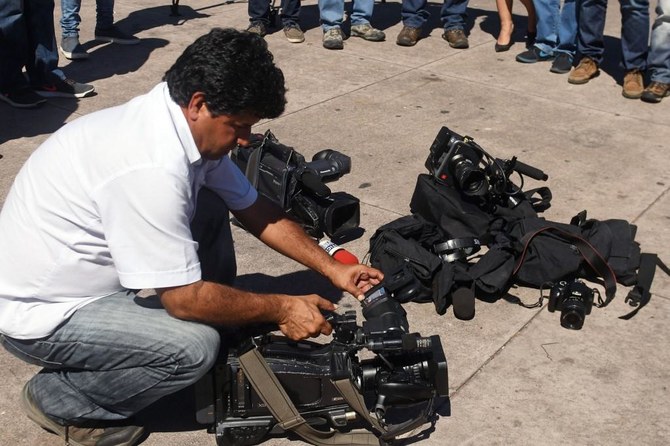
- Report finds that nearly three dozen Salvadorian journalists had their phone hacked since mid-2020 and implanted by sophisticated spyware, aka Pegasus
Gaza’s Mohammed Salem wins World Press Photo of the Year award with haunting image of woman cradling dead niece
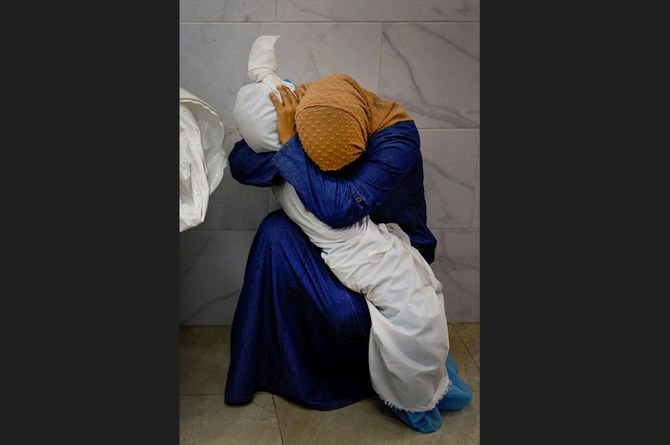
- Picture was taken on Oct. 17, at Nasser hospital in southern Gaza, where families searched for relatives killed during Isralei bombing
- ‘I hope photo makes world more conscious of the human impact of war, especially on children,’ Salem said
The picture was taken on Oct. 17, 2023, at Nasser hospital in Khan Younis in southern Gaza, where families were searching for relatives killed during Israeli bombing of the Palestinian enclave.
Salem’s winning image portrays Inas Abu Maamar, 36, sobbing while holding Saly’s sheet-clad body in the hospital morgue.
“Mohammed received the news of his WPP award with humility, saying that this is not a photo to celebrate but that he appreciates its recognition and the opportunity to publish it to a wider audience,” Reuters’ Global Editor for Pictures and Video, Rickey Rogers, said at a ceremony in Amsterdam.
“He hopes with this award that the world will become even more conscious of the human impact of war, especially on children,” Rogers said, standing in front of the photo at the Nieuwe Kerk in the Dutch capital.
Announcing its annual awards, the Amsterdam-based World Press Photo Foundation said it was important to recognize the dangers facing journalists covering conflicts.
It said 99 journalists and media employees had been killed covering the war between Israel and Hamas since the Palestinian militant group attacked southern Israel on Oct. 7 and Israel responded by launching a military offensive in Gaza.
“The work of press and documentary photographers around the world is often done at high risk,” said Joumana El Zein Khoury, the organization’s executive director.
“This past year, the death toll in Gaza pushed the number of journalists killed to a near-record high. It is important to recognize the trauma they have experienced to show the world the humanitarian impact of the war.”
Salem, a Palestinian aged 39, has worked for Reuters since 2003. He also won an award in the 2010 World Press Photo competition.
The jury said Salem’s 2024 winning image was “composed with care and respect, offering at once a metaphorical and literal glimpse into unimaginable loss.”
“I felt the picture sums up the broader sense of what was happening in the Gaza Strip,” Salem said when the image was first published in November.
“People were confused, running from one place to another, anxious to know the fate of their loved ones, and this woman caught my eye as she was holding the body of the little girl and refused to let go.”
’PROFOUNDLY AFFECTING’
Salem’s wife had given birth to their child days before he took the shot.
The photograph is “profoundly affecting,” said jury member Fiona Shields, head of photography at Guardian News & Media.
The jury selected the winning photos from 61,062 entries by 3,851 photographers from 130 countries.
GEO photographer Lee-Ann Olwage of South Africa won the story of the year category with images documenting dementia in Madagascar.
The long-term projects category was won by Alejandro Cegarra of Venezuela for the series “The Two Walls” for The New York Times/Bloomberg.
Ukrainian photographer Julia Kochetova won the open format award with “War is Personal,” which documented the war in her country by weaving together pictures, poetry, audio and music in documentary style.
Arab League, OIC Islamic Broadcasting Union sign media protocol
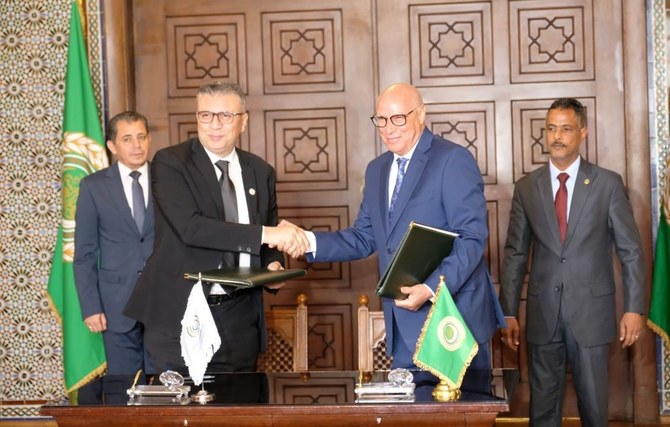
- Protocol encompasses various areas of collaboration, and focuses on training and capacity building in media and journalism
- Ambassador Ahmed Rashid Khattabi expressed optimism that the collaboration will contribute to promoting values of tolerance and moderation
CAIRO: The Arab League said that a media cooperation protocol will be signed between its Secretariat’s Media and Communication Sector and the OIC Islamic Broadcasting Union.
The Arab League added that “as part of efforts to cement ties between the General Secretariat of the League of Arab States and the Organization of Islamic Cooperation (OIC) Radio and Television Union, and in line with the General Secretariat’s commitment to fostering relations with regional and international organizations, a cooperation protocol will be signed between the General Secretariat’s Media and Communication Sector and the OIC Islamic Broadcasting Union.”
The protocol encompasses various areas of collaboration, and focuses on training and capacity building in media and journalism. It aims to bolster media exchange between the League of Arab States and the OIC, facilitate the sharing of expertise and knowledge in media practices, organize joint media initiatives, and conduct specialized training courses and workshops.
Ambassador Ahmed Rashid Khattabi, assistant secretary-general and head of the Media and Communication Sector, said that the protocol shows the commitment of both organizations to advancing professional cooperation.
He highlighted the importance of aligning with rapid technological advancements to meet the evolving needs of both entities.
Khattabi commended the significance of this protocol, stressing the vital role of intensified media cooperation between Arab and Islamic nations.
He expressed optimism that the collaboration will contribute to promoting values of tolerance and moderation, while rejecting extremism, and fostering deeper media and cultural exchanges.
The signing ceremony will take place at the headquarters of the General Secretariat of the League of Arab States in Cairo.
In response to the secretary-general’s directive, Khattabi will sign the cooperation protocol on behalf of the General Secretariat of the League of Arab States. Amr Ellissy, president of the OIC Radio and Television Union, will sign on behalf of the union.
Social media platform X blocked in Pakistan over national security, ministry says

- Ministry accuses X of failing to address its concerns, says ban was in ‘interest of upholding national security’
- X has been blocked since country election in February, with activities critizing ban aims to stifle democratic accountability
ISLAMABAD: Pakistan’s interior ministry said on Wednesday it had blocked access to social media platform X around the time of February’s election on national security concerns, confirming a long-suspected shutdown.
Users in Pakistan have reported problems using X, formerly known as Twitter, since mid-February, but the government had made no official announcement on the matter until now.
The interior ministry mentioned the shutdown in a written submission to Islamabad High Court on Wednesday. Another court has told the government to reconsider the ban within a week, said Abdul Moiz Jafri, a petitioner and advocate.
“It is very pertinent to mention here that the failure of Twitter/X to adhere to the lawful directives of the government of Pakistan and address concerns regarding the misuse of its platform necessitated the imposition of a ban,” the ministry said in its court submission, which was seen by Reuters.
It said X had been reluctant to resolve the issue. X did not immediately respond to a Reuters request for comment on Wednesday.
“The decision to impose a ban on Twitter/X in Pakistan was made in the interest of upholding national security, maintaining public order, and preserving the integrity of our nation,” the ministry report said.
Access to X has remained limited since the Feb. 8 national election, which the party of jailed former prime minister Imran Khan says was rigged.
KHAN’S PARTY IS BIG USER OF X
Among Pakistan’s political parties, Khan’s party is the most prolific user of social media platforms, particularly after the country’s traditional media began censoring news about the ex-cricket star and his party ahead of the polls. Khan has over 20 million followers on X, making him the most followed Pakistani.
Khan says Pakistan’s military was behind his ouster as prime minister in 2022 and that it helped his opponents form the current government, despite candidates backed by his party winning most seats in February’s election. The military denies this charge.
He remains in jail on a number of convictions, most of which came days before the election.
Many government officials in Pakistan, notably Prime Minister Shehbaz Sharif, continue to use X — most likely through VPN software that bypasses the blocks.
The decision to temporarily block X was taken after considering confidential reports from Pakistan’s intelligence and security agencies, the ministry report said.
It said “hostile elements operating on Twitter/X have nefarious intentions to create an environment of chaos and instability, with the ultimate goal of destabilising the country and plunging it into some form of anarchy.”
Rights groups and marketing advertisers have raised concerns.
Digital rights activist Usama Khilji said the block on X seemed designed to hinder the democratic accountability which he said a platform with instant updates of real-time information enables, especially amid the allegations and evidence of rigging which surfaced following the election.
Marketing consultant Saif Ali said: “It has become nearly impossible to convince Pakistani advertisers to invest in Twitter for brand communications, due to the platform being throttled by governmental authorities.”
Palestinian journalists urge US media to boycott correspondents’ dinner with Biden

- Appeal issued due to administration’s involvement in Israel’s actions in Gaza
LONDON: Palestinian journalists are urging their US counterparts to boycott the White House Correspondents’ Association dinner over the Biden administration’s involvement in Israel’s actions in Gaza.
The appeal, which has been endorsed by 25 Palestinian journalists from Gaza and from other countries, was officially issued on Tuesday after endorsement campaigns lasting a couple of weeks.
The letter said: “As Palestinian journalists, we urgently appeal to you, our colleagues globally, with a demand for immediate and unwavering action against the Biden administration’s ongoing complicity in the systematic slaughter and persecution of journalists in Gaza.
“For Palestinian journalists in Gaza, the blue press vest does not offer us protection, but rather functions as a red target.”
Media watchdogs have reported that at least 97 journalists and media workers have been among the more than 34,000 killed since the conflict began on Oct. 7.
Many others are missing or being detained by the Israeli military “for merely fulfilling our journalistic duties.”
Some 25 journalists have signed the letter, although some have chosen to remain anonymous for fear of retaliation by the Israeli army.
The letter includes signatures from renowned Gaza-based journalists such as Bisan Owda and photojournalists Mohamed Almasri, Ali Jadallah, Hosam Salem, and Mohammed Zaanoun.
The appeal has also been supported by the Palestinian Journalists Syndicate and Palestinian reporters working outside Gaza, including Mariam Barghouti, Mohammed El-Kurd, and Said Arikat, the Washington bureau chief for Al-Quds newspaper.
The letter criticizes the annual event — scheduled for April 27 — as an attempt by the US administration to manipulate the media by sacrificing journalistic ethics for access.
The letter added: “For journalists to fraternize at an event with President Biden and Vice President Harris would be to normalize, sanitize, and whitewash the administration’s role in genocide.
“The press plays an integral role in standing up against injustice by illuminating the truth and holding power to account.
“Journalists in Gaza cannot continue to bear the burden of doing so alone. It is past time journalists take action for journalists in Gaza.”
Dubai-based Telegram platform to hit 1 bln users within year, founder says
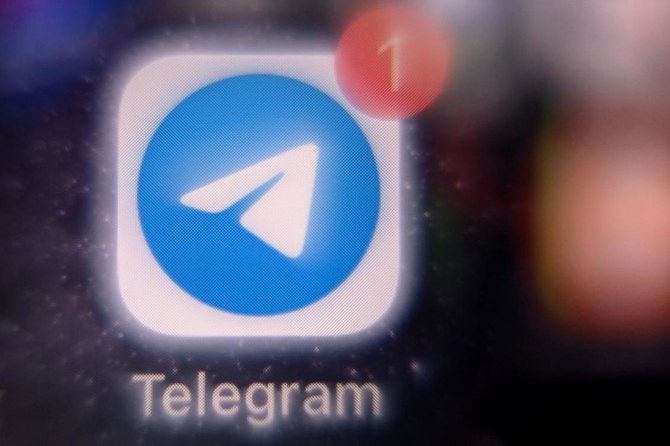
- Goal is to remain neutral and not a “player in geopolitics,” Pavel Durov said in interview
LONDON: The Telegram messaging app, one of the most popular social media platforms in Ukraine and Russia, will likely cross 1 billion active monthly users within a year, its founder said in remarks published on Tuesday.
In a rare interview, Pavel Durov told US journalist Tucker Carlson that the Dubai-based free cloud-based app that allows users to send and receive messages, calls and other files, is spreading like a “forest fire.”
“We’ll probably cross 1 billion monthly active users within a year now,” Durov, who fully owns Telegram, told Tucker, according to the video interview posted on Tucker’s account on the X social media platform.
The goal of the app, which has now 900 million active users, is to remain a “neutral platform” and not a “player in geopolitics,” Durov said. The Russia-born entrepreneur said he had fled Russia in 2014 citing government interference in a company he founded.
One of Telegram’s main rivals, Meta Platforms’ WhatsApp, has more than 2 billion monthly active users. The Financial Times reported in March that Telegram would likely aim for a US listing once the company had reached profitability.
After Russia launched its full-scale invasion of Ukraine in 2022, Telegram has become an instrumental tool for both governments and a go-to place for posting and accessing unfiltered information about the war.
Almost all major media, government entities and public figures in both Russia and Ukraine operate content channels on Telegram.
Ukraine’s President Volodymyr Zelensky posts his daily video addresses on the app, while his armed forces warn of air raids and document battlefield developments. The Kremlin announces President Vladimir Putin’s activities on Telegram, while Russia’s opposition rallies for support.
But the app, critics said, has also become a tool of misinformation and manipulation. A bill submitted to the Ukrainian parliament in March looks at stricter regulation of Telegram and other social networks.
The Kremlin told Durov to be more attentive after the messaging application was allegedly used to help recruit the gunmen who attacked a concert hall outside Moscow in March.





